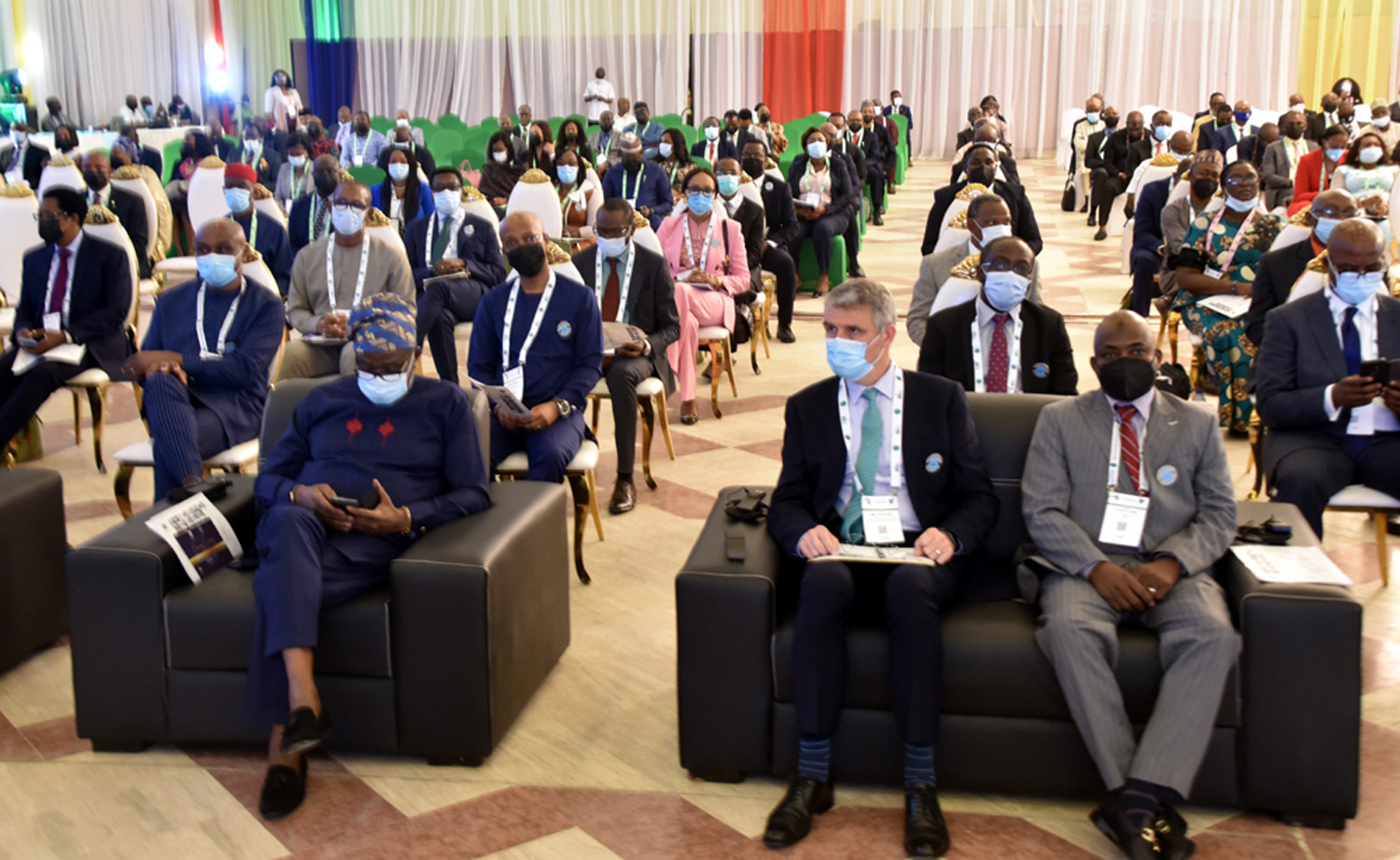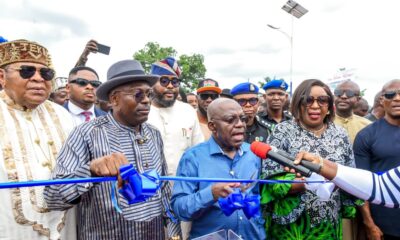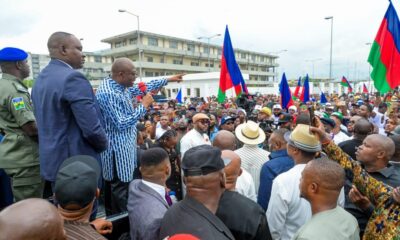Business
Has Port Concession Met Stakeholders’ Expectations?
In 2006, the Federal
Government conceded Nigerian ports to 26 private terminal operators to ensure efficiency and reduce costs of doing business at the ports.
Stakeholders, conversely, note that although the aim of the concession is to improve productivity and competitiveness, little of the objectives of the exercise have been achieved.
They, nonetheless, admitted that before the concession regime, Nigerian Ports Authority (NPA) demonstrated low level of efficiency resulting in long Turn Around Time (TAT) for ships and increased cargo dwell time.
According to them, the cargo dwell time is in contrast to the 48-hour international standard to clear cargo at ports.
“The pre-concession era was also marked with over-bloated, excessive port charges and pilfering, while ports infrastructure remained in decadence.
“Nigeria’s shipping profile nose-dived with the sale of 21 ships belonging to the defunct Nigerian National Shipping Line (NNSL).
“Up till today, efforts to resuscitate the national carrier NNSL since its demise in the 90s proved abortive.
“Indigenous ship owners also groaned over lack of jobs as their ships were rendered idle, a situation which had yet to improve,’’ they observe.
They opine that conceding Nigerian ports to private operators ought to have improved services beyond the expectations of Nigerians.
In the light of this, Chief Kunle Folarin, the Chairman, Nigerian Port Consultative Council, called for an assessment of the port concession regime.
At a news conference on the Review of Port Concessioning in Lagos recently, he pointed out that in spite of the high expectations of Nigerians from the concession; little improvement had taken place at the nation’s ports.
“Corrupt practices are still prevalent among ports operators, complaints of high port charges still persist as well as lack of adequate and modern equipment by the terminal operators.
“Ships and cargo are lost to neighbouring countries because of excessive charges and access roads to the ports are in deplorable condition,’’ he said.
Sharing similar sentiments, Malam Mohammed Bashar, the Permanent Secretary, Federal Ministry of Transport, said that the port reform had not even met some expectations of government.
He noted that arbitrary and high port charges, undue delay of cargo clearance and abuses of the concession agreement were prevalent.
He explained that the purpose of the concession exercise was to encourage investors in the port sector through Public Private Participation and to reduce cost of doing business at the ports.
He explained that the government approved the concession to create jobs and ensure user-friendly port services.
Bashar, however, said that the Federal Government had made efforts to address the negative impact of port concession by appointing the Nigerian Shippers’ Council (NSC) in 2014 as the interim regulator.
He said that the NSC would establish effective regulatory regime to control tariffs, rates, charges and other related economics activities.
Assuring the stakeholders of efficient services at the ports, Mr Hassan Bello, the Executive Secretary of NSC, said that the council would address cumbersome cargo procedure, massive capital flight, leakages in revenue and inadequate information of port processes.
“Nigerian ports remain costly and uncompetitive, leading to continuous diversion of Nigerian cargo to ports in neigbouring countries,’’ he observed.
He said that the council, as the economic regulator, would abrogate some illegal costs at the ports and increase demurrage and storage free days.
He said the council had constituted quarterly meetings of customs area controllers and collaborated with the relevant agencies to clear the port access roads.
Bello said the council had also set a bench mark rate to discourage arbitrary charges and it had taken steps to ensure full automation of ports operations, vessel intelligence, cargo intelligence and risk management.
“We are working towards the enforcement of the publication of terminal operators rates as specified in the concession agreement in order to install healthy competition ,’’ he said.
This, notwithstanding, a maritime lawyer, Mr Osuala Nwagbara, opined that concession exercise was not a complete failure.
“There is no doubt that nearly10 years after the leasing of port infrastructure to private entrepreneurs in Nigeria, there had been remarkable improvement in port development and service efficiency.
“There have also been complaints by users of port services that concessionaires of Nigerian ports have not kept to the terms and conditions of the tripartite agreement between the concessionaires, Nigerian Ports Authority and Bureau of Public Enterprises,’’ he said.
Nwagbara said it was heartwarming that the role of the NSC as interim port regulator had been gazetted.
“We will look forward with zeal and great hope to invoke sanction against violations of the provisions of the lessee and the concession agreement in the port system.
Similarly, some concerned citizens hold the belief that port concession regime has encouraged increase in cargo throughput imports and exports from 44, 952 containers in 2005 to 1.2 million in 2014, while TAT had also increased.
They advise relevant authorities to address corruption and ensure that documentation processes at ports are internet technology-compliant.
According to them, the NSC, as economic regulator, must issue transparent and enforceable guidelines that will ensure the realisation and sustenance of the objectives of the port reforms.
By and large, Nwagbara advised that the NPA must perform its own obligations and monitor the concessionaires and other service providers with the enforcement of the concession agreement.
Cole writes for News Agency of Nigeria.
Aisha Cole
Business
Western Marine Command Intensifies Anti-Smuggling Operations … Intercepts N8.75m Worth PMS
For officers and men of the Western Marine Command of the Nigeria Customs Service (NCS), the battle is not over until smuggling is over.
In the wake of Wednesday May, 8, 2024, the ever vigilant officers, acting on a tip-off, intercepted 177 sacks and 61 kegs of 25 litres containing petroleum products, valued at about N8.750,000million.
The items were intercepted along Isalu Creek, Badagry Waterway en-route Benin Republic.
While briefing newsmen, the Command’s Customs Area Controller, Comptroller Paul Bamisaiye, said: “This seizure is most economically significant to the Command at this period of scarcity of Petroleum Products, especially Premium Motor Spirit (PMS) in our cities, and shows the anticipatory posture in our response to economic saboteurs.
“At about 2:330hrs on Wednesday 8th May 2024, while on joint patrol by teams in the Command, credible intelligence was received of the movement of 2 boats laden with what was suspected to be petroleum products concealed in sacks. Upon receipt of the information, the team moved into Isalu creeks, Badagry waterway.
“On sighting the approach of the Officers, the smugglers took to their heels through the shore of the Creek. The loaded boats were then towed to the station at Badagry where preliminary examination was conducted and transferred to Western Marine Command Headquarters, Ibafon, Apapa, Lagos.
“Careful examination at the Command Headquarters revealed that the arrest was found to contain One Hundred and Seventy Seven (177) Sacks and Sixty One (61) Kegs of 25 Litres Premium Motor Spirit (PMS) containing Twelve Thousand Five Hundred (12,500) Liters with a total Duty Paid Value standing at Eight Million Seven Hundred and Fifty Thousand Naira (N8,750,000) only”.
Bamisaiye noted that the action of the smugglers is a contravention of Section 245 & 254 of the Nigeria Customs Service Act 2023 which the service, through Western Marine Command, is responsible for enforcing.
“The Command, under the leadership of Compt. PK Bamisaiye, is poised more than ever to rid the waterways of all acts of smuggling and economy sabotage for the benefit of the growth of economy of Nigeria”, he said
Bamisaiye said so far, no suspect was arrested in the Command’s anti-smuggling operations.
Nkpemenyie Mcdominic, Lagos
Business
Illegal PMS Trading Booms In Lagos

Petroleum products being sought by motorists have disappeared from virtually all filling stations within Lagos and its environs, but are now booming in business in retail outlets.
Investigations by our correspondent revealed that while the product could not be got at some of the petrol service stations, activities are in top gear in the local retail outlets where the price has gone beyond the reach of users.
It was also gathered that in some filling stations supplied with the products, preference are often given to retail outlet operators by petrol attendants against the consuming public.
A source, directly involved in the business, said some petrol dealers are cashing on the irregular supply to divert the products to retail outlets where they could easily make their gains.
It was also gathered that some sales representatives in the service of major oil marketing firms indulged in the diversion exercise because of their personal interest.
At the retail outlets a liter goes for N950,00 against the normal N760,to N800 at some stations.
Nkpemenyie Mcdominic, Lagos
Business
Customs Board Appoints Five DCGs, Eight ACGs
The Nigeria Customs Service Board (NCSB) has confirmed the appointment of five Deputy Comptroller-Generals (DCGs) and eight Assistant Comptrollers-General (ACGs) of Customs during its 59th regular meeting.
The meeting, chaired by the Honorable Minister of Finance and Coordinating Minister for the Economy, Mr. Wale Edun, was held at the Nigeria Customs Service Headquarters in Abuja last Tuesday.
National Public Relations Officer of the Service, Chief Superintendent of Customs, Abdullahi Maiwada, who disclosed this in a statement yesterday, gave details of the confirmed appointments as: O.O. Peters (DCG /Commander, Training and Doctrine Command (rtd); B.M. Jibo (DCG Enforcement Inspection & Investigation); and B.U. Nwanfor (DCG Excise, Free Trade Zone & Industrial Incentives).
Others are: S.A. Bomia (DCG, Commander Training and Doctrine Command); and C.K. Niagwan (DCG, Tariff & Trade).
The Assistant Comptrollers General (ACGs) are: B. Imam (ACG Board); A.A.S. Oloyede (ACG, Trade & Tariff); S.K. Dangaldima (ACG/Zonal Coordinator, Zone ‘B’); A. Abdul Azeez (ACG/Zonal Coordinator, Zone ‘D’); S.A. Yusuf (ACG, Human Resource Development); N.P. Umoh (ACG, Training and Doctrine Command); C.O. Obih (ACG/Zonal Coordinator, Zone ‘C’); and S. Chiroma (ACG, Strategic Research and Policy).
The new appointments, according to the statement, were made to fill the vacancies created by some senior officers who recently retired from the Service, noting that the principles of federal character, seniority and merit guided the appointments approved by the board.
“These appointments are a testament to the officers’ exemplary services and dedication to the Nigeria Customs Service. The NCSB remains committed to providing strategic leadership to ensure effective and efficient service delivery for optimum performance”, he said.
While thanking the retired members of the management for their meritorious services, the Comptroller General of Customs, Bashir Adewale Adeniyi, congratulated the newly confirmed officers and charged them to redouble their efforts to ensure the service attains greater heights in its mandates of revenue generation, suppression of smuggling, and trade facilitation amongst others.
Nkpemenyie Mcdominic, Lagos
-
Rivers4 days ago
Don Urges Fubara To Be People-Oriented In Governance
-

 Featured4 days ago
Featured4 days agoWe Inherited Huge Debt -Fubara …As Gov Otti Inaugurates Aleto-Ogale-Ebubu-Eteo Road Project
-
Rivers2 days ago
Ongoing Elele-Omoku Road Awarded At N80bn – RSG
-

 News2 days ago
News2 days agoCelebrate, We’re Liberated, Fubara Tells IYC …Says Detractors Now Victims Of Their Ploys
-
Politics4 days ago
Plan To Marry Off Orphans: FG Sues Niger Speaker
-
Niger Delta2 days ago
Forum Unveils Vision, Commends Diri On Project Execution
-
Business2 days ago
NCDMB Recommits To Support On Local Capacities
-
Business4 days ago
PoS Operators Take CAC To Court

